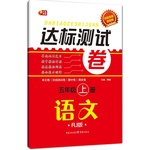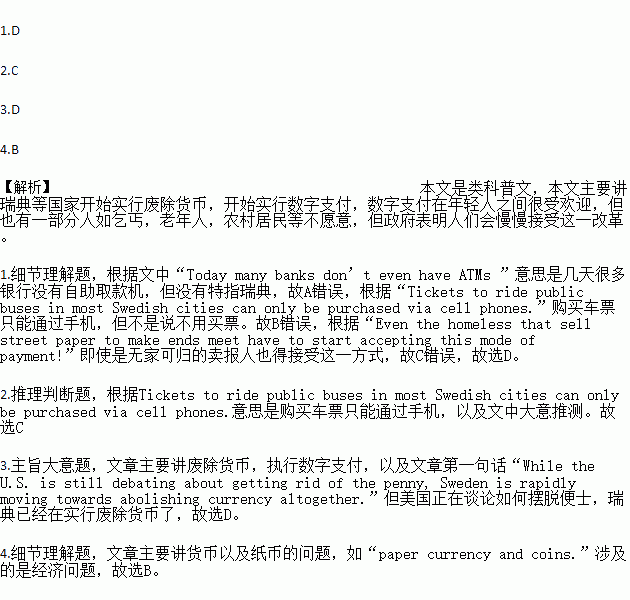题目内容
While the U.S. is still debating about getting rid of the penny, Sweden is rapidly moving towards abolishing currency altogether. Though this may sound radical(过激的), it is a natural evolution in this digital society.
Sweden, which was the first European country to introduce banknotes in 1661, has just been working harder to convince its residents that digital payments are a safer alternative to carrying cash.
Over the years, the idea has gained popularity with residents, especially the younger generation that is much more comfortable with technology. Today many banks don’t even have ATMs and some have stopped handling cash altogether!
Tickets to ride public buses in most Swedish cities can only be purchased via cell phones. Numerous businesses are also moving towards accepting only digital payments. Even the homeless that sell street paper to make ends meet have to start accepting this mode of payment!
But despite its growing popularity, some people don’t like this radical idea. They include the homeless, elderly people as well as those living in rural areas who are still uncomfortable with mobile phones and computers. But the officials are confident that in the very near future, they will be able to convince everyone to move this safe and more cost-effective payment system.
Sweden is not the only country trying to abolish paper currency and coins. The movement is rapidly gaining ground in Denmark and Finland as well. In 2014, Israel announced a three-step plan to go cashless and just last week the vendors(小贩)of a popular street in Sydney declared they would stop accepting currency from customers. Whether this phenomenon spreads remains to be seen. But one thing is for sure—With increasingly advanced payment systems being introduced every day, pulling out cash is rapidly becoming “uncool”.
1.What can we infer from Paragraph 3 and 4?
A. Many banks in Sweden don’t have ATMs.
B. You don’t have to buy tickets when riding buses.
C. People don’t give the homeless money but food.
D. People can just take cell phones when shopping.
2.According to the passage, which information is RIGHT?
A. Sweden was the first country to get the idea to abolish currency.
B. The younger generation is opposed to the measures.
C. Bus fare can only be purchased via cell phones in most Swedish cities.
D. Banks in Sweden have stopped dealing with cash completely.
3.Which of the following can be the best title for the text?
A. An Advanced Country –Sweden
B. A Controversial Government Policy
C. Sweden to Influence the World’s Cash Payment
D. Sweden to Become the World’s First Cashless Society
4.Which of the following categories does this passage belong to?
A. Education.
B. Economy.
C. Travel.
D. Insurance.
 芒果教辅达标测试卷系列答案
芒果教辅达标测试卷系列答案---For just the weekend.I am due for a forum in Hainan next Monday morning.( )
| A. | are you staying | B. | have you stayed | C. | did you stay | D. | do you stay |
请按以下提示.
| 竞选职位:学校英语俱乐部副主席 个人优势:(1)性格外向、与人相处融洽 (2)善于组织各种活动 中选后决心:协助主席,服务同学 中选后设想:举办讲座、英语晚会、英语演讲比赛等活动来提高同学英语水平,激发学习兴趣 表达愿望:希望同学们投票选你,相信你能干好工作 |
[写作要求]
1.句子结构准确,信息内容完整,篇章连贯,可适当发挥.
2.词数100左右.短文的开头和结尾已给出,不计入总词数.
Good afternoon,my dear friends,
My name is LiJin.
Today I am very glad to have the chance to run for the vicepresident of the English Club.Concerning this position,I feel qualified for the job because I am outgoing,getting on well with others,and skilled at organizingall kinds of activities.If I am lucky enough to be the vice president,I will try my best to assistthe president and serve my fellow students.In order to improve our English and make more studentsinterested in English,I intend to organize some activities such as lectures,English parties,English speech contests andso on.I sincerely hope you will vote for me and please believe that I will bea good vice president..
Thank you.
| A. | more than | B. | less than | C. | other than | D. | rather than |
| A. | wherever | B. | whatever | C. | whichever | D. | whenever |

